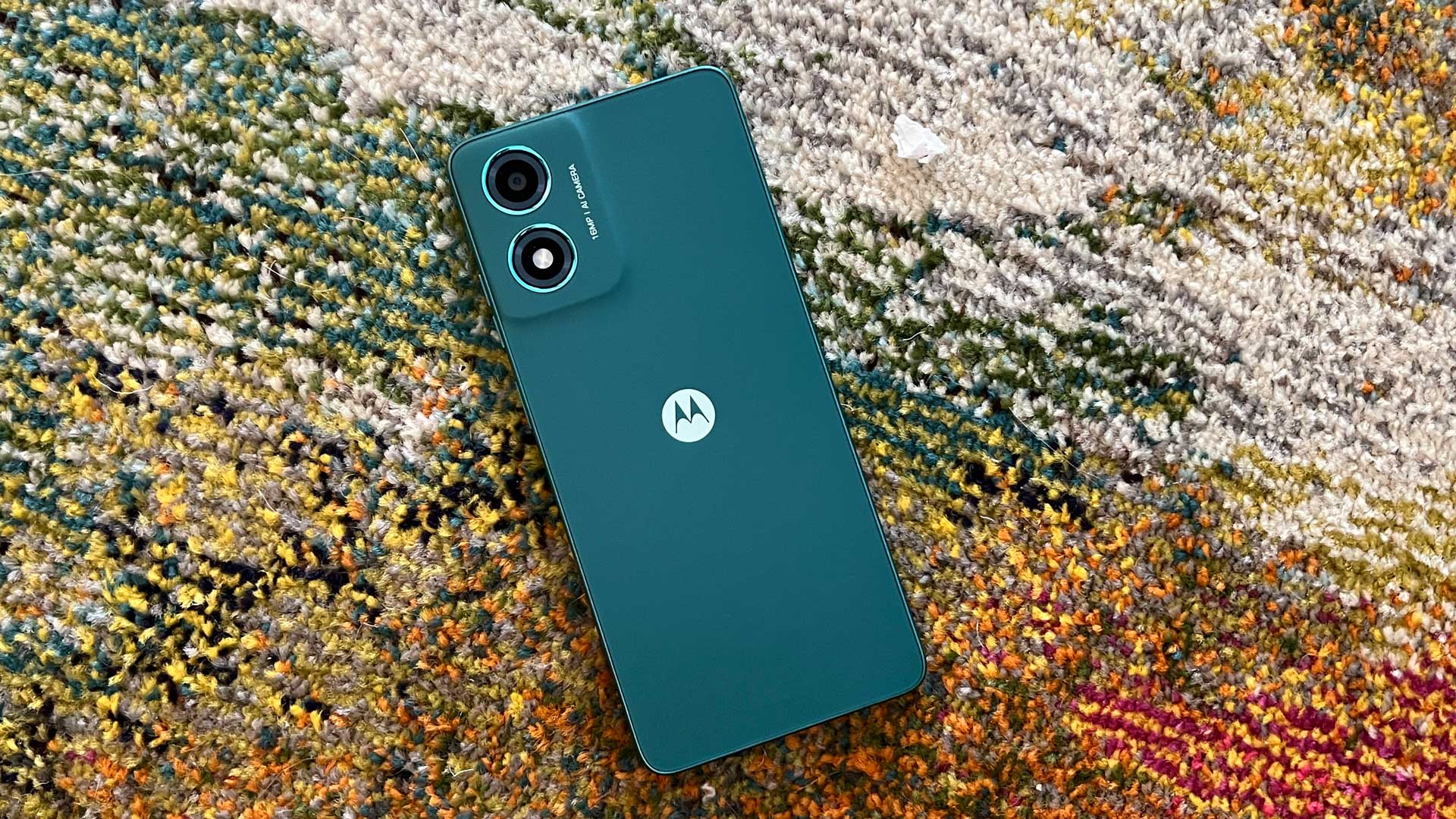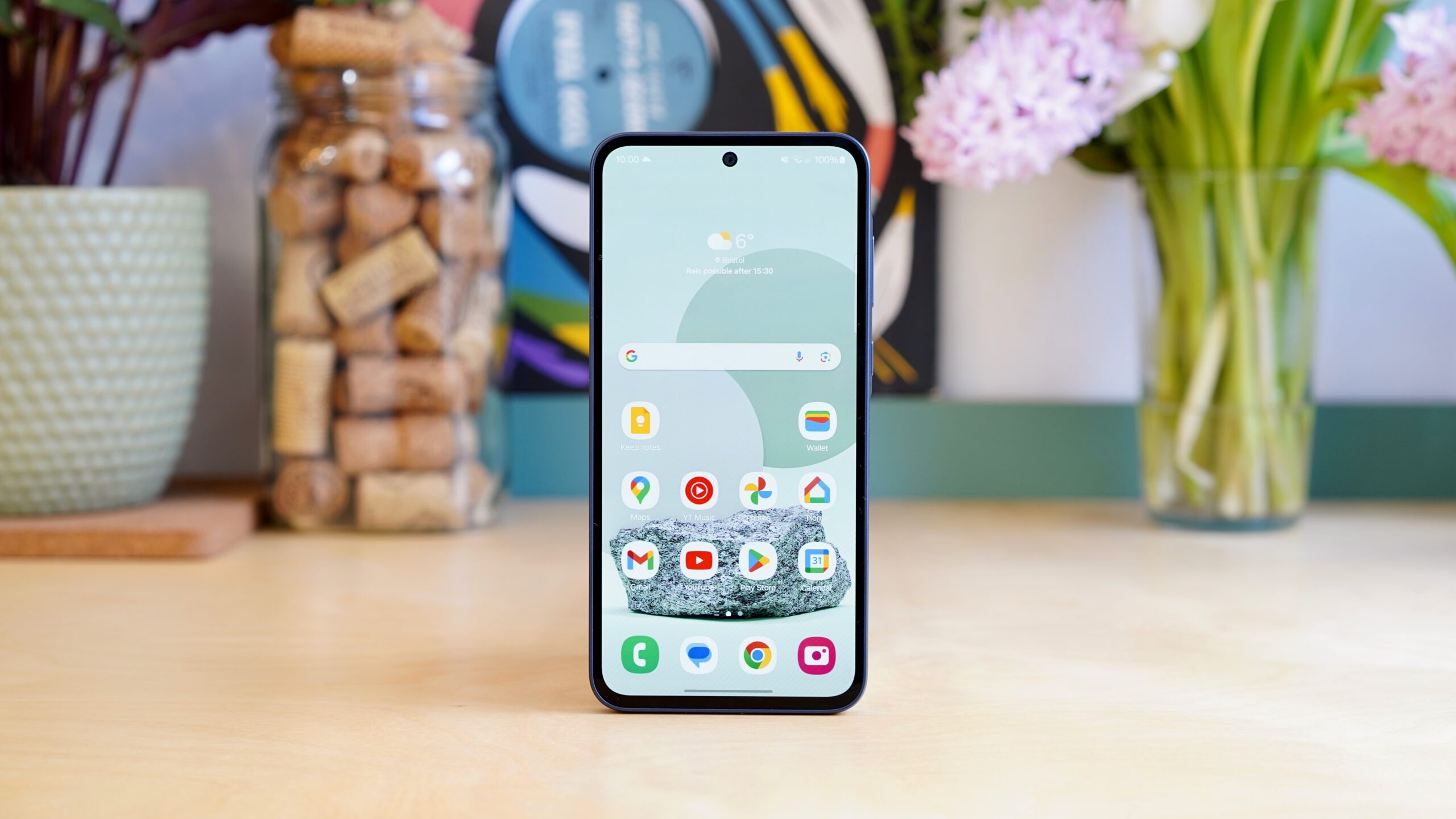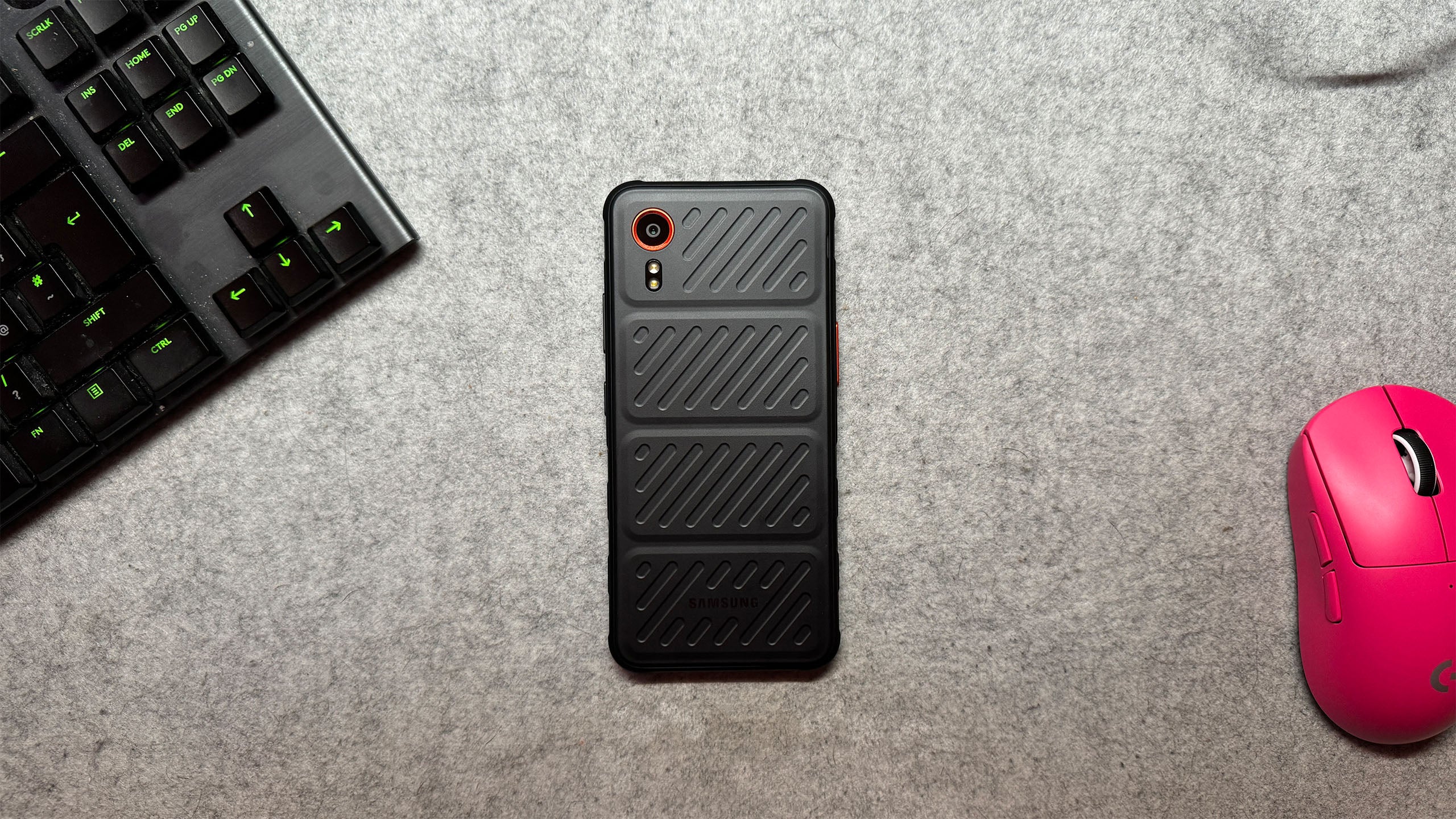OnePlus Nord 2 5G Review
A very good, affordable phone


Verdict
The OnePlus Nord 2 5G is a more affordable alternative to the OnePlus 9. It looks and feels just as good, gaming performance is strong and even the camera is no clean sweep for the OnePlus 9, as the Nord 2 offers better selfies and cleaner night images. However, battery life disappoints.
Pros
- Great gaming performance
- Near flagship-grade primary camera
- OnePlus 9-beating selfie camera
- Good value
- Strong stereo speakers
Cons
- Mediocre battery life
- No big screen updates
- No IP rating, expandable storage or wireless charging
Availability
- UKRRP: £399.99
- USAunavailable
- EuropeRRP: €399
- Canadaunavailable
- Australiaunavailable
Key Features
- MediaTek Dimensity 1200 AIOnePlus puts a MediaTek CPU in its phones for the first time. It offer excellent gaming performance, if not quite Qualcomm Snapdragon-level efficiency.
- Stereo speakersThe Nord 2 has two speakers, one on the front above the screen and another on the phone’s bottom. Great for gaming.
- 50MP cameraA 50MP Sony camera is a highlight, able to shoot very good quality images in day and light.
Introduction
The OnePlus Nord 2 5G is one of the best phones to consider if you would like a high-end Android but find the idea of spending £800 or more ridiculous.
It looks, feels and runs like a top-end Android but costs a lot less, giving it some of the bargain flavour that made us recommend OnePlus phones so highly back in the company’s early years.
The OnePlus Nord 2 5G doesn’t have a zoom camera and its battery life is only passable. But it is excellent value, and a worthy follow-up to the original OnePlus Nord.
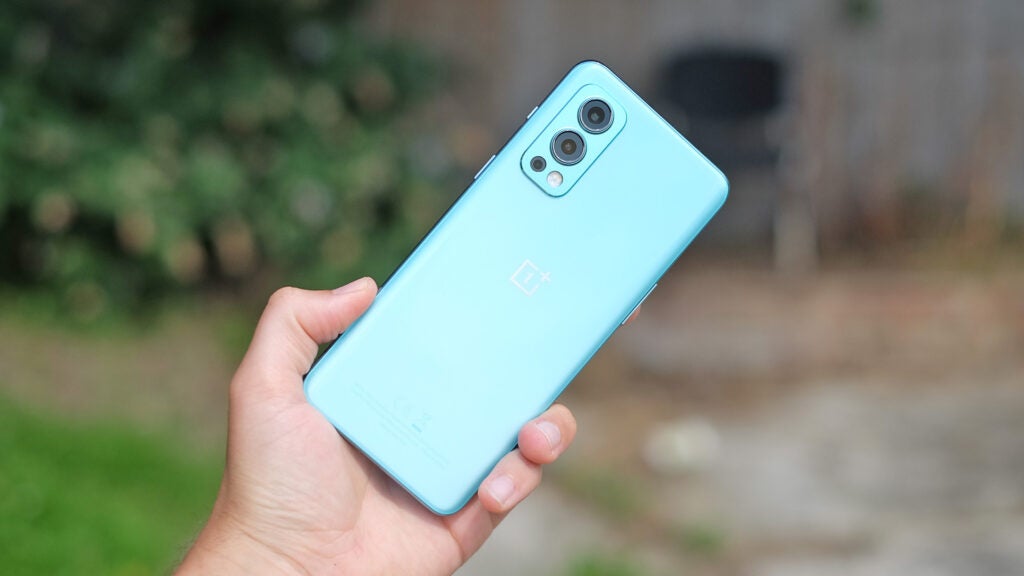
If you’re wondering whether this phone is worth the upgrade over the OnePlus Nord CE 5G, I think it is. A glass back means it feels and looks more expensive, and the camera array is in another league, getting close to the quality of the OnePlus 9. It even beats it in a few areas.
The OnePlus Nord 2 5G is available in two core models. There’s an entry-level version with 8GB RAM and 128GB storage. It costs £399.
OnePlus’s step-up Nord 2 5G has 12GB RAM and 256GB storage, and costs £469. Which should you buy? OnePlus’s upgrade fees are fair, but £70 will buy you a lot of treats.
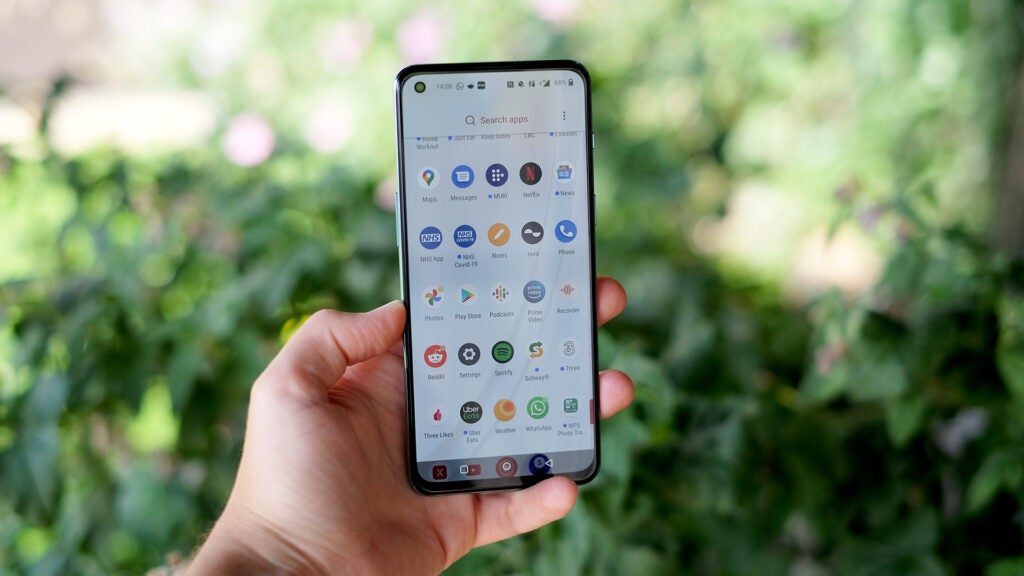
Design
- Glass-back design is a clear step up from the Nord CE 5G
- Loud stereo speakers
- Fast in-screen fingerprint scanner
The OnePlus Nord 2 5G looks quite a lot like the OnePlus 9. And that is notable in part because the Nord CE 5G didn’t.
There’s the bug-eyed camera housing OnePlus introduced in its 9-series phones and classic OnePlus hardware features like the silent mode slider return. However, the glass back is the part I appreciate most.
The OnePlus Nord 2 5G uses Gorilla Glass on front and back, and the rear panel is curved at the sides to make the phone feel thinner. This phone feels very similar to the OnePlus 9, just a little smaller, and much nicer than the Nord CE 5G, which seems a bit cheap by comparison.
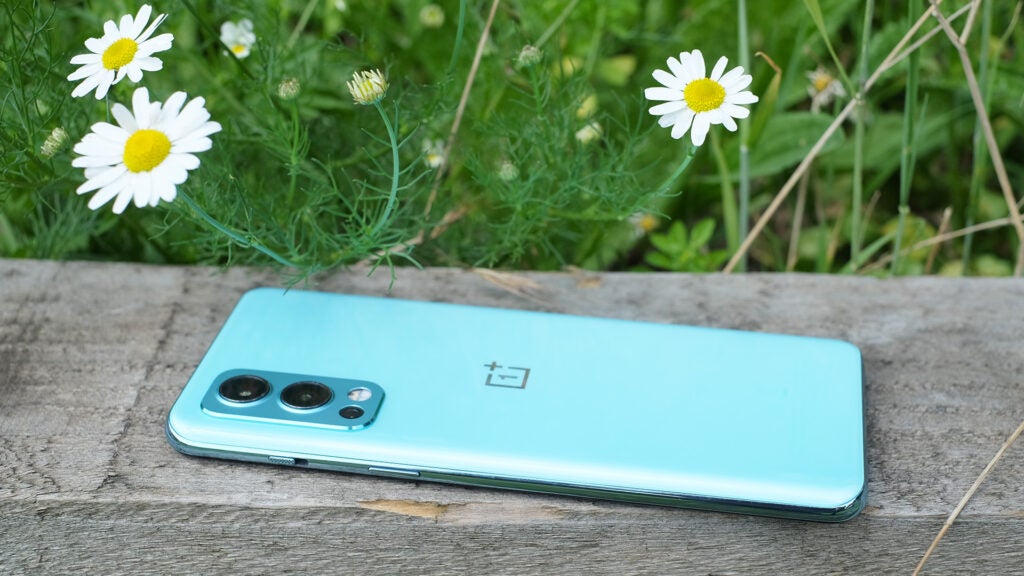
It’s not an entirely no-compromise design, though. The OnePlus Nord 2 5G’s sides are plastic, a “fiberglass infused polymer”, not aluminium. Hardened plastic like this is going to pick up dents and scuffs less easily.
On the other hand, the glossy, chrome-like finish may also show off any damage so I’d recommend using the silicone case OnePlus puts in the box. While OnePlus always makes a good selection of “official” cases for its phones, the bundled one is good. It has a textured panel across the back where your hand rests to avoid the tacky feel of flat silicone.
And, as usual, the OnePlus Nord 2 5G comes with a factory-applied screen protector. There’s no official water resistance rating here, but if you put the thing in its case from day one it should be pretty easy to keep pristine.
However, these are the basics common to all OnePlus phones I’ve used since 2013. Parts that deserve more attention include the OnePlus Nord 2 5G’s loud and fairly beefy-sounding stereo speakers and what OnePlus calls Haptics 2.0.
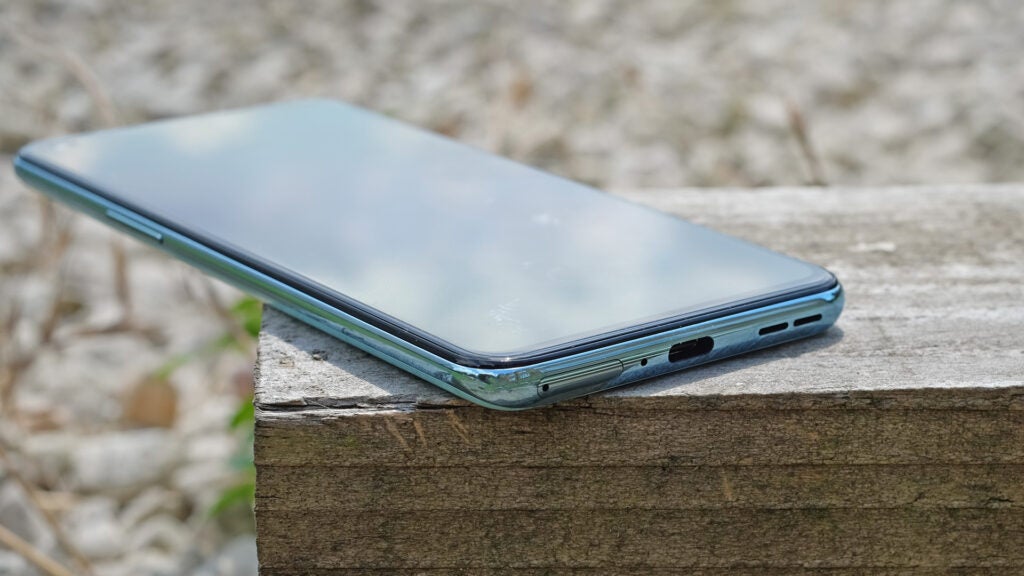
The first thing I noticed on day one of using the OnePlus Nord 2 5G was that its vibration effects are more refined and sophisticated than you usually get in the best mid-range phones. On unlocking with a finger scan you can get a little haptic ”tap”, switching to Silent mode with the hardware slider results in two lighter taps. And, of course, the OnePlus Nord 2 5G can produce the classic buzz of a phone call vibrate. These kinds of haptics are usually associated with the best iPhones. The OnePlus 9 has similar feedback.
You could call this stuff needless fluff. But I noticed this change before digging into the OnePlus Nord 2 5G feature list and realising it had a name, Haptics 2.0, and it does help the phone feel more like a high-end Android than a budget one.
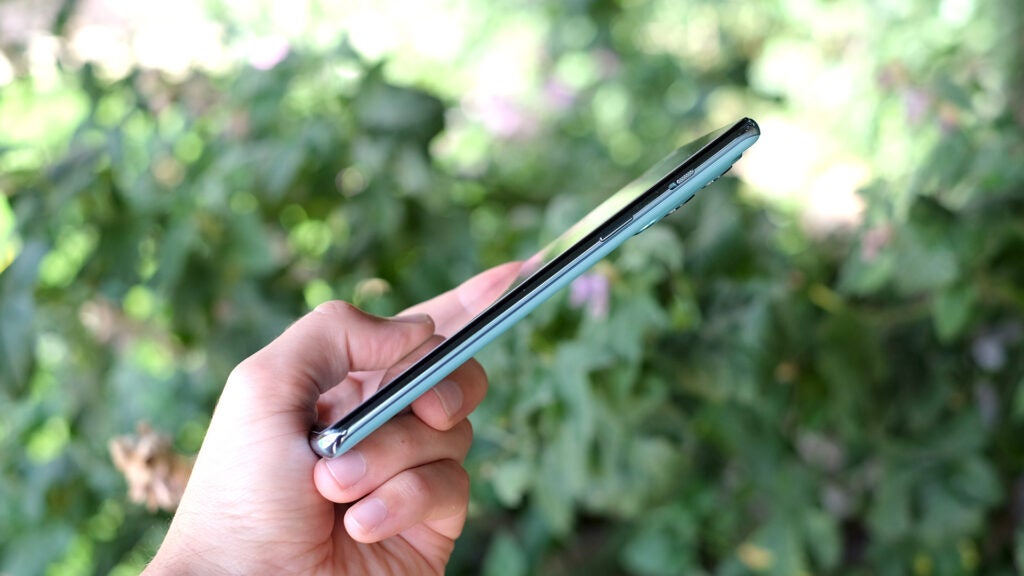
As does the fingerprint scanner. The OnePlus Nord 2 5G has an in-screen fingerprint reader. And unlike some of the cheaper phones that use this style, there are no issues with its speed or reliability. It seems just as fast as that of some flagship phones.
There is nothing significant to dislike here at the price. Well, aside from the lack of a headphone jack or microSD slot. If you want one of those I’d suggest one of Xiaomi’s cheaper Poco or Redmi phones, several of which are brilliant lower-cost options, particularly if you don’t care about 5G. A few of the best still only have 4G mobile internet, like the Xiaomi Redmi Note 10 Pro.
Screen
- OnePlus 9-beating display brightness
- Mid-rankning 90hz refresh rate
The OnePlus Nord 2 5G has a 6.43-inch Full HD OLED screen with a 90Hz refresh rate. This puts its roughly on par with the OnePlus 8 released a little over a year before this Nord. Newer OnePlus phones have 120Hz OLED screens, likely because the cost of those components has since come down.
A higher refresh rate results in smoother-scrolling menus, but you do still get the bump up from standard 60Hz.
It’s a great screen. Sharp, bold and fairly bright, in most situations, it is often hard to distinguish the OnePlus Nord 2 5G screen from that of a phone twice the price.

Peak brightness has become one of the few things that makes a meaningful difference between mid-range and high-end Androids so I took the OnePlus Nord 2 outdoors with the Nord CE 5G and OnePlus 9 to see how it stacks up.
The OnePlus Nord 2 is, surprisingly enough, the brightest of the three. While it doesn’t reach the sort of levels as an iPhone 12 or Galaxy S21 Ultra (despite OnePlus claims of 1000-plus nits for the OnePlus 9) in general use, outdoors visibility is very good.
Performance
- A smooth, responsive take on Android
- Great gaming performance for the price
- First OnePlus phone with a MediaTek CPU
The Nord 2 is the first OnePlus phone not to use a Qualcomm processor. It has a MediaTek one instead, the Dimensity 1200-AI. MediaTek chipsets were once considered the cheap and often not very good alternatives to Qualcomm models, but this one is pretty powerful.
Still, OnePlus likely used it instead of the excellent Snapdragon 870 because the Dimensity is cheaper.
General performance is excellent. The OnePlus Nord 2 seems to run about as fast as the OnePlus 9 as you dart around Android. Performance in high-end games like Fortnite is also strong for this price class.
Set Fortnite to Epic graphics with the resolution slider to 100% and it stays more-or-less locked to 30fps even at the start of the round as you fall from the drop ship. This part causes obvious slow-downs even in a great budget gaming chipset like the Snapdragon 765G.
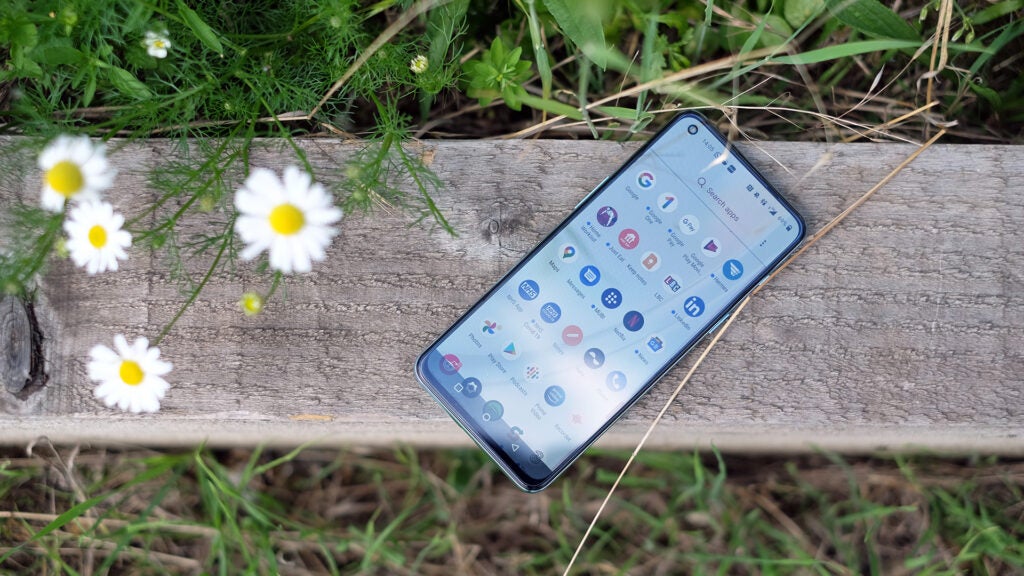
According to 3DMark’s Wildlife benchmark, the Nord 2’s Dimensity 1200-AI has gaming power similar to a Snapdragon 865+. It beats the OnePlus 8T, which is less than a year old at the time of release. CPU performance is roughly level with the OnePlus 8T’s Snapdragon 865, judging by the Geekbench score of 2748.
OnePlus also offers very fast storage. The 256GB version tested reaches read speeds of 1218MB/s and writes of 548MB/s according to the A1 SD Bench app. That means you get ‘writes’ similar to a fast SATA SSD, and ‘reads’ more like those of an NVMe SSD from a couple of years ago. Not bad for a mid-range phone. This likely has a hand in making apps load quickly.
I can see why OnePlus chose this MediaTek chipset to divert from its traditional Qualcomm-only approach, although I am not convinced the Dimensity 1200 AI is as power-efficient as some Qualcomms. Read the battery life section for more on this.
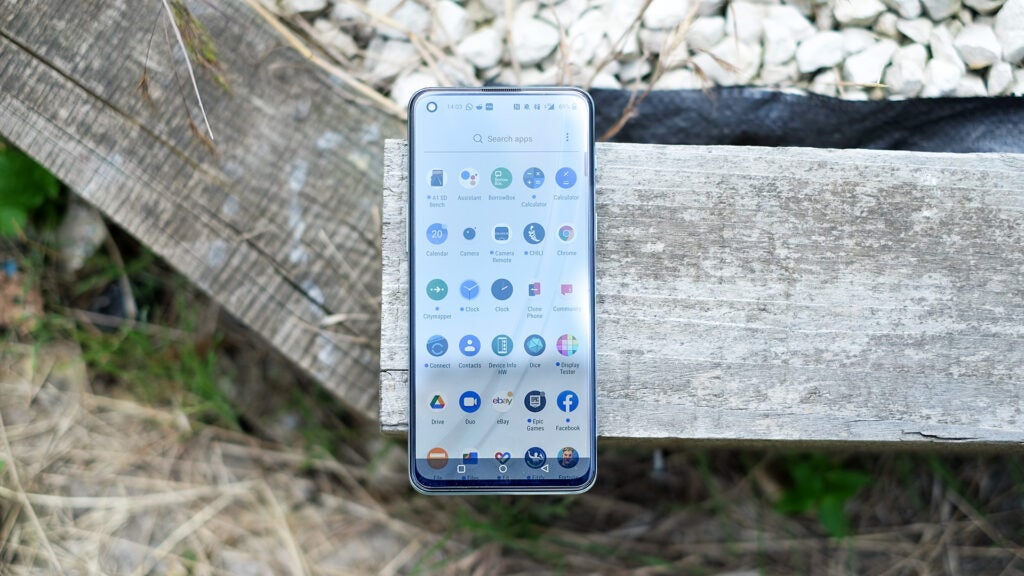
Camera
- Strong 50MP primary camera even performs well at night
- Weaker wide camera
- Fairly poor digital zoom
The OnePlus Nord 2 has three rear cameras but you might as well consider it a dual camera system. Its third is one of the 2MP monochrome cameras OnePlus has used in previous phones.
I’m not even sure where it’s used. OnePlus has said it’s for one of the specific B&W colour filters in previous phones. But there’s only one B&W mode in the Nord 2 and the results don’t seem to change if you put your finger over the monochrome camera’s lens.
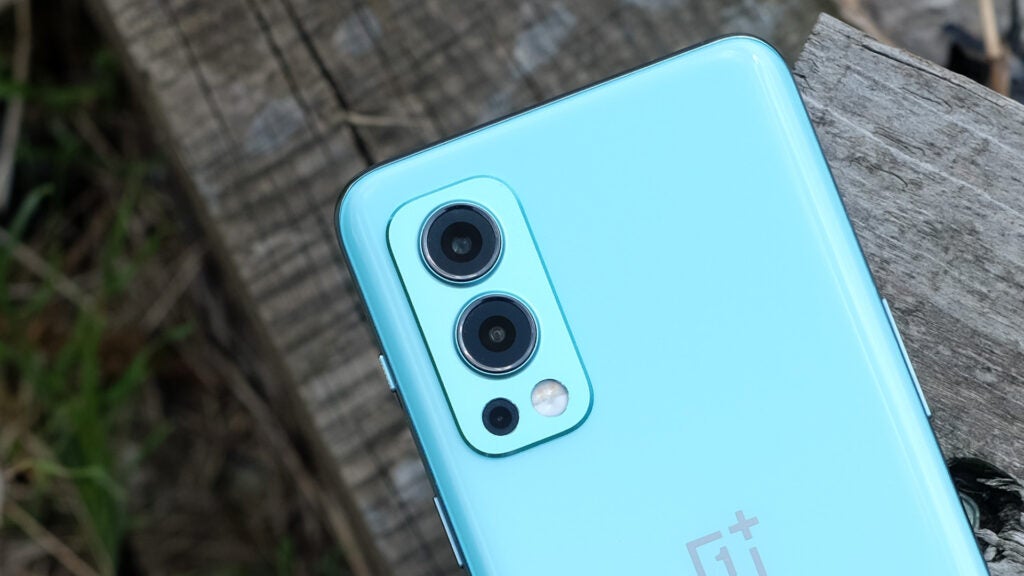
The real reason OnePlus likely uses a third camera is because a triple camera phone will sell better than a dual camera one, even if that tertiary lens is completely useless. It’s there because we’re all idiots, in other words.
That out of the way, the OnePlus Nord 2 camera is great, and a significant upgrade over the cheaper Nord CE 5G’s.
The parts I appreciate most are how fast and responsive this camera feels for a mid-range model and that the Auto HDR processing seems next-to bulletproof. There’s no noticeable shutter lag, no fundamental focus issues, images are processed and finalised in the gallery at a similar speed to a phone with a Snapdragon 888 CPU.
It’s in a completely different universe to the similarly-price Sony Xperia 10 III, which is sluggish and unreliable. And cycling between the two fields of view provided by the primary and ultra-wide cameras is quick in the OnePlus Nord 2 as well.
This stuff matters just as much as image quality, as it makes a phone camera enjoyable to use.
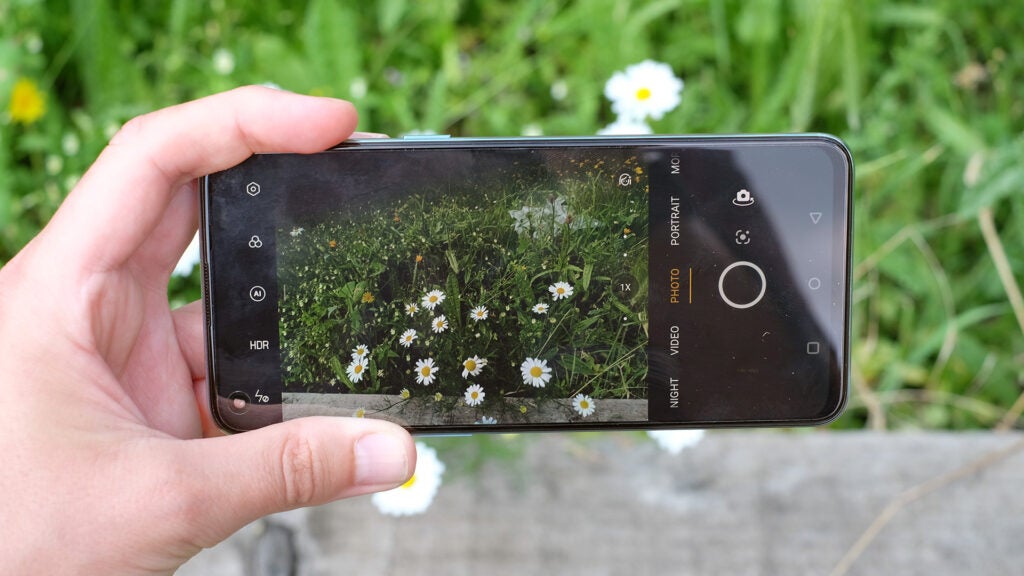
The Nord 2’s main camera has a 50-megapixel Sony IMX766 sensor, the same seen in the top-end Oppo Find X3 Pro. OnePlus also uses it in the ultra-wide camera of the OnePlus 9. It captures 12.5 megapixel images, combining four pixels in the sensor for every one in the final image.
It’s a quality sensor with a photosensitive area of 1/1.56 inches, much larger than the classic compact camera size. And, of course, this camera benefits from all the computational photography tricks that have levelled up up the best camera phones in recent years.
As mentioned earlier, Auto HDR is the highlight for me. In shots that need it, the HDR processing brings out so much shadow detail there’s literally nothing left to bring up in Photoshop by manual excavating the shadow areas. And yet, unlike some of the (much) earlier-gen OnePlus phones, the OnePlus Nord 2 never seriously oversteps, which would result in a kind of tonal flattening.

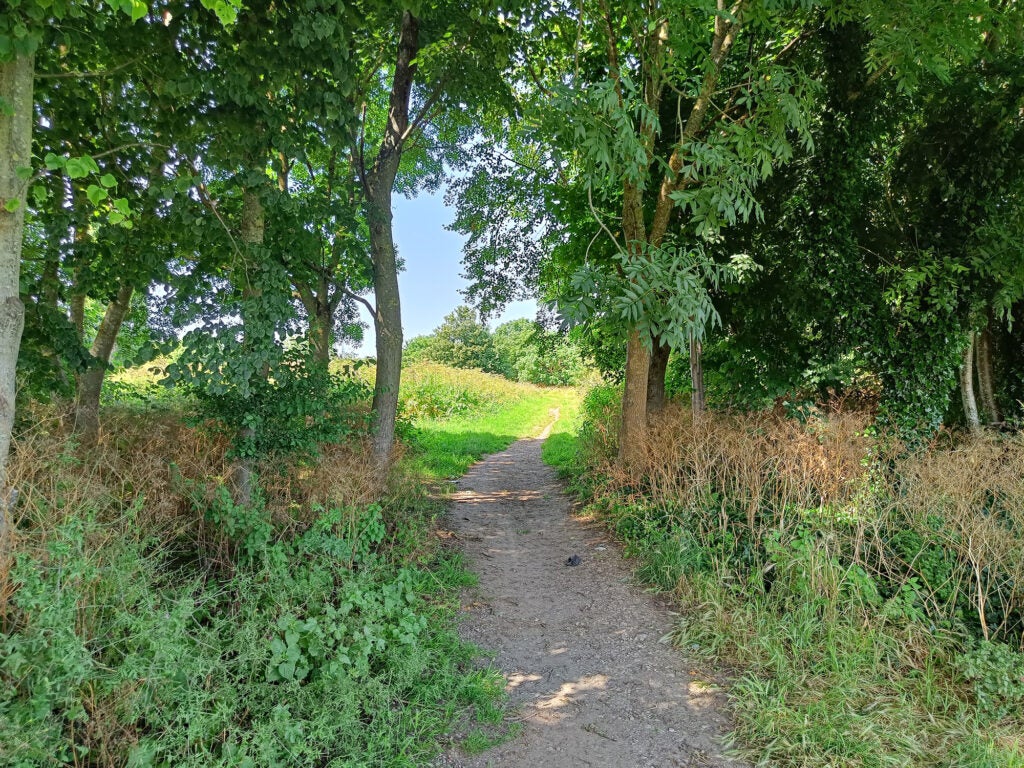
Pictures are bold and bright, with some minor over saturation of colour that can be amped up further when HDR works its hardest. Keep the OnePlus Nord 2 on its standard Auto HDR mode and you really can’t go far wrong. Even if you expose the scene to, say, a dark bush in the foreground with a semi-cloudy sky up above and the sun in view, the camera processing can still keep up and avoids almost all overexposure.
This is what you get when a flagship-grade sensor is matched with strong image processing. Are the pictures ultra-realistic and reserved? Not always, no. OnePlus favours a rich, punchy and bright image. But there’s nothing like the camera-wide oversaturation I saw in the Realme 8 Pro.

The OnePlus Nord 2 is actually even better at night than the OnePlus 9, in some respects anyway. It brings out more fine detail, exhibits far less noise and produces an overall brighter image.
The night mode, called simply “Night” in the app, seems to have four seconds no matter how dark the scene is, but the results are very impressive for a 5G Android at this price.
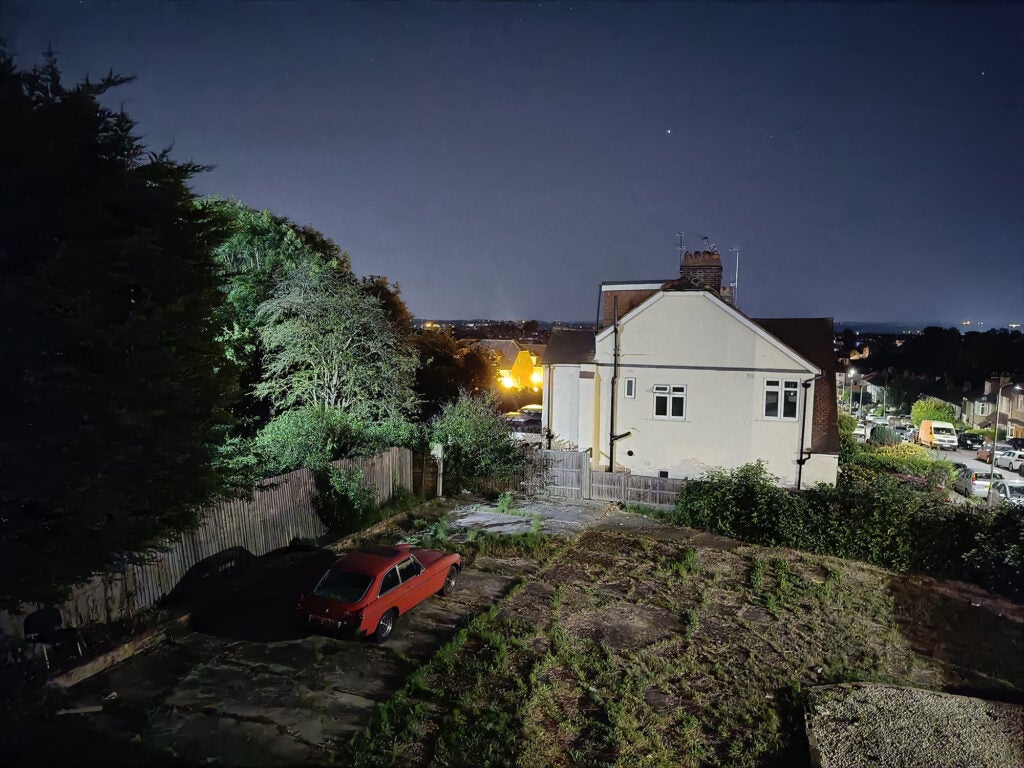
OnePlus’s Nord 2 is one of the more affordable phones with a camera that seems properly equipped to handle any lighting situation, from having almost zero of the stuff to scenes with extremely stark light contrasts.
The primary camera is also optically stabilised, meaning there’s a little motor that tilts the lens to compensate for movement during shooting. This will help with night photography, much as merging of exposures is the real hero in all modern low-light modes in phones.
The OnePlus Nord 2 has one of the more fun-to-use, reliable cameras at this level. But this mostly only applies to the main camera.

Our ultra-wide has a lower-end 8-megapixel sensor. And while it’s solid next to the many found in £200-300 Androids, there’s a clear step down in quality when you switch to the wide.
Colour tone is cooler, the lower native dynamic range sometimes results in unnatural sky gradients even with OnePlus’s Auto HDR to help. And you can see much more clearly that HDR working, with halos around some objects and a slight tonal flattening at times.
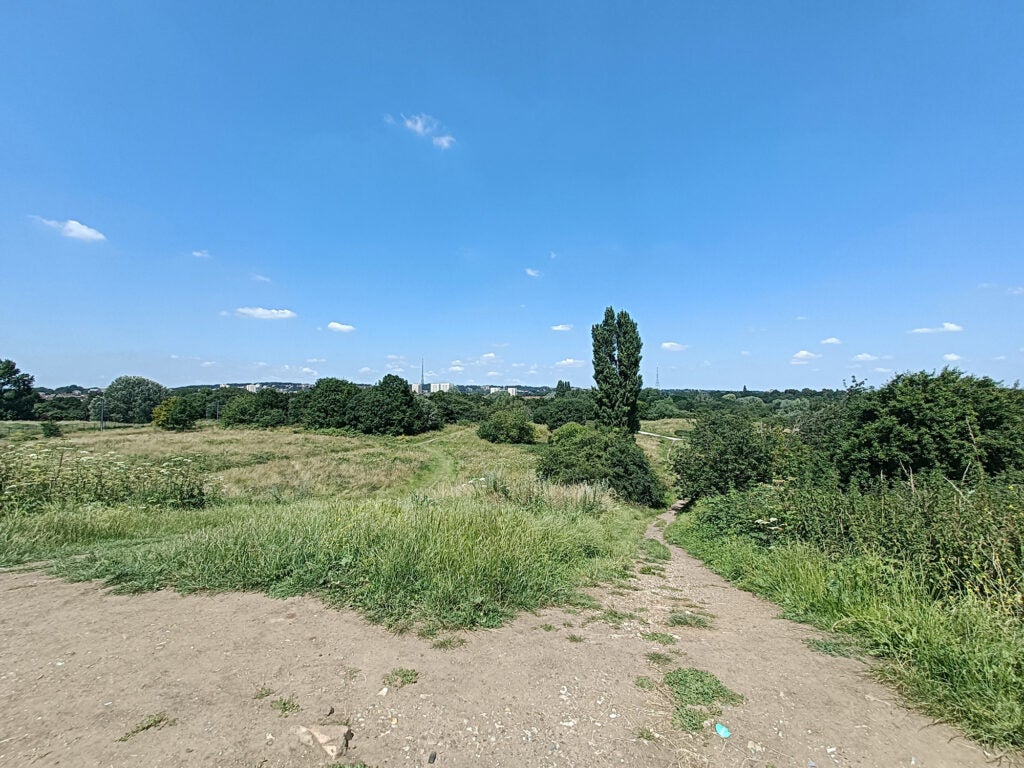
The Nord 2’s main camera keeps up with the OnePlus 9’s, and even beats it in some situations. But the ultra-wide is not even close to the excellent cameras on the higher-end OnePlus phones. Still, it’s good to have, can still shoot decent images and compares well enough with other phones in this class.
There are some gripes to note in other areas. The OnePlus 9’s main camera can’t focus particularly close, so is not great for macro photography, but I have managed to get some decent results using the 2X digital zoom mode.
Don’t rely on digital zoom too much for actual zoom shots, though. The app has presets for 2x and 5x, and the latter produces terrible images. They each use a different profile. The 2x gives images a decent-looking wavy patina down at pixel level, but this switches to a strategy of short hard lines (in textures) and massively boosted edge contrast at 5x.

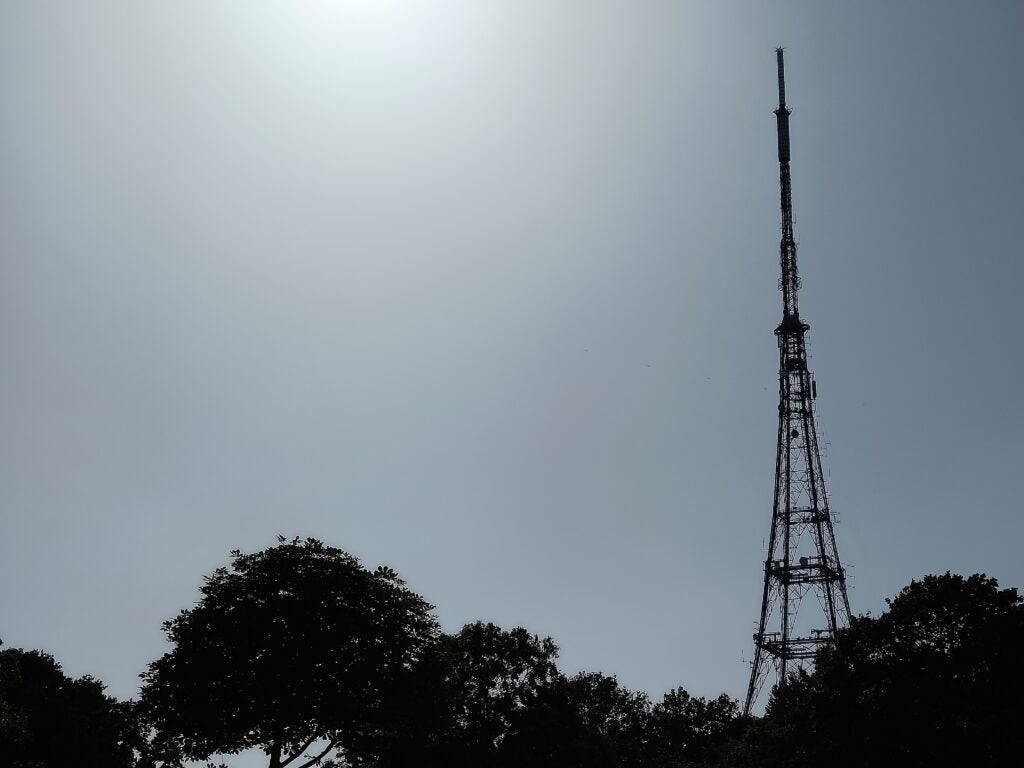
The OnePlus Nord 2 is miles behind the £250 Realme 8 Pro in this area. That phone offers a masterclass on what can be done with digital zoom in a budget phone.
I also think the Nord 2 is perhaps a little too heavy on noise reduction across the board. While this doesn’t seem to impact fine detail much, natural textures look a little too artificially constructed down at pixel level.

The smart processing is, however, a big help, in the portrait mode. It produces some of the more convincing background blur effects I’ve seen from a phone, with generally good edge detection and lovely smooth progressive blurring as objects get further away.
The Nord 2’s blur mode won’t nail an image with tiny and thin plant stems, but Portrait is well worth using. It’s just a shame it’s so picky about how far you are from the subject. You can’t get particularly close, or particularly far away.

Video capture is also a couple of steps behind the OnePlus 9’s. The OnePlus Nord 2 can shoot 4K video, but only at 30fps rather than 60fps. There is no 8K video mode either, of course. However 4K/30 uses a combination of optical and software (electronic) image stabilisation, to great effect.
While software stabilisation can reduce the wobble of handheld footage, you need OIS to minimise the frame blurring that occurs in lower light from footfall motion. The Nord 2 seems to do this pretty well.
The phone’s selfie camera also has some real chops. It uses a 32MP megapixel sensor, the highest-res one seen in a OnePlus phone yet, as the company was keen to tell us. And we see some of the same tricks used in the main camera.
Dynamic range processing is, again, excellent. No blown-out backgrounds here. And the Nord 2 can even use its four-second Night mode for selfies. However, in most cases you don’t need it. Pixel binning alone seems to allow for better fine facial hair detail than you see in the Night mode, and the results are great even in very poor lighting.
In good lighting, the Nord 2 selfies beat the OnePlus 9’s. In bad lighting, they pretty much steamroll them. OnePlus gets bonus points for this one. It really needn’t need to try so hard with this selfie camera but, for whatever reason, it did.
Battery life
- 4500mAh battery, the classic OnePlus capacity
- Disappointing battery life
- Extremely fast charging
The OnePlus Nord 2 would be one of my absolute favourite 2-3 phones of the year so far were it not for one not-so-little thing: battery life.
No OnePlus phone has truly great battery life. The company seems to favour making them perform well 24/7 and relying on the company’s super-fast charging to make you forgive that you might need to give the phone a top-up before a night out. But the are few things I like more in phones than seeing 40-50% battery life by the end of the day.
The OnePlus Nord 2 and its 4500mAh battery don’t even get close. On every day of testing the phone has been left running of the crisp fragments at the bottom of the packet by 9:30pm. Two day use? No chance.
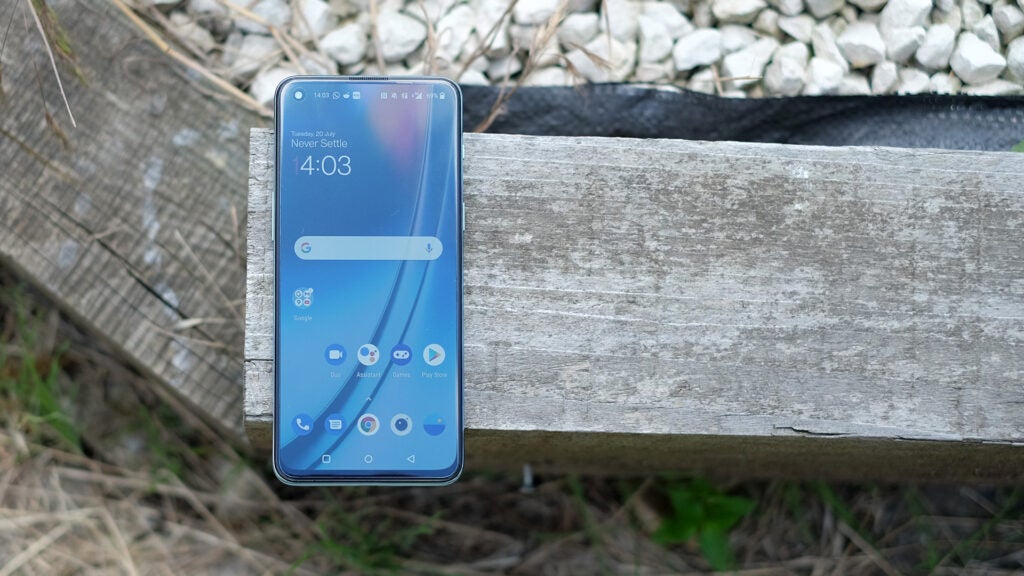
However, my Nord 2 testing period also landed during a UK heatwave, so I will have spent more time with the screen at max brightness and working at hotter-than-average temperatures. To get an idea of whether the Nord 2 has — as it seems to me — at least slightly shorter battery life than the OnePlus 9, I tried a side-by-side test.
I used an app called Generic Battery Drainer to see if the Nord 2 drained more slowly when maxing-out the screen brightness, CPU, GPU, and making calls to Wi-Fi, Bluetooth and GPS.
After 22 minutes the OnePlus 9 had lost 11% charge, the Nord 2 16% charge. I had to stop the test at this point because excessive heat made the Nord 2 put a hard lock on the screen brightness, making the comparison unfair. Its “battery temperature” was nearing 50 degrees centigrade while the OnePlus 9 had settled to around 45.8 degrees.
This may less bad than it sounds, as our test room was 28.9 degrees at the time – hardly normal indoor temperatures.
While not conclusive proof of much other than the OnePlus 9 uses juice less quickly under strain, it is in-line with my observations that the Nord 2’s battery life is not great even by OnePlus’s at-best middle-ranking standards.
I also tried a lighter online video streaming test, matching the phones’ screen brightness at roughly mid-level. The OnePlus 9 lost seven percent battery after an hour, the OnePlus Nord 2 nine percent. Its MediaTek chipset may be to blame.
The OnePlus Nord 2 leans heavily on its 65W charging, which is best-in-class. OnePlus has removed the initial battery health measure of reducing charge speed for the first few minutes (perhaps linked to the shift to a MediaTek chipset), getting you from flat to 50% in 13 minutes. You’re at 98% in 30 minutes and it tips over to 100% in just under 32 minutes.
The big question here is whether you’re happy to forego reliable 1.5-2 day battery life, safe in the knowledge 10 minutes plugged in refills a big chunk the battery. Still, the limited basic stamina does get on my nerves.
Best Offers
Should you buy it?
You want to get as close to a flagship experience as you can get for £400: the Nord 2 fits the bill. You get a strong main camera, good speakers and tip-top performance in Android and its most demanding games.
The OnePlus Nord 2’s battery life is not impressive: While it should last a full day of moderate use, you may find you need to give it a quick top-up on heavier days. It’s slightly higher maintenance than some.
Final Thoughts
The OnePlus Nord 2 is a near-perfect £400 Android phone if you can cope with one thing. Its battery life is not great, and the heavy user will have to occasionally give it a mid-day top-up to avoid evening headaches. OnePlus’s ultra-fast charging makes this less onerous than it might otherwise be, but it’s not ideal.
Still interested? The Nord 2 is a well-made phone with a great primary camera that can even beat the OnePlus 9’s in a few situations. And its selfie camera beats the OnePlus 9’s in all conditions.
General performance is excellent, and it’s perfect for gaming. That’s not just about frame rates, but also the use of good stereo speakers and a bold, bright OLED screen.
How we test
FAQs
There is no official waterproof rating here
No, you can choose between 128 or 256GB of storage
You’ll get a full charge in about 30 minutes using the included charger
Trusted Reviews Test Data
Specs
See below to see how the OnePlus Nord 2 compares to the other current OnePlus devices in terms of specs.

